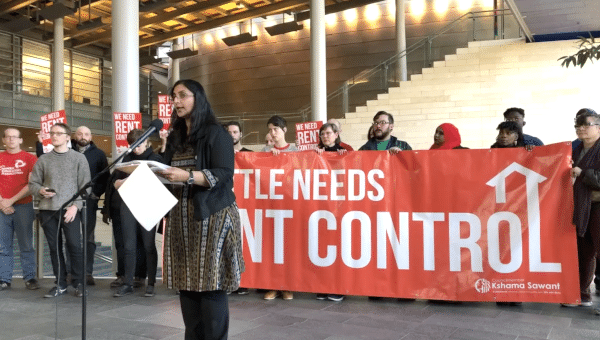A cynic once said,
I if you can’t win an argument, then change the subject.
The big landlords and their defenders in the Democratic political establishment can’t defend the indefensible: Rents soaring nearly 92 percent in the last decade, squeezing working class tenants while corporate landlords like Essex ($408-million in 2022 profits), Equity ($807-million in profits) and Avalon Bay ($1.1-billion in profits) enrich the billionaire class.
Setting limits on how much landlords can increase rents, as Councilmember Kshama Sawant’s legislation would do the moment the unjust state rent control ban is lifted, is a commonsense response to this sick profiteering. Limiting rent increases to the inflation rate—with no sneaky loopholes for landlords to exploit—really is the bare minimum that Seattle should do to address the housing affordability crisis. It’s no wonder that rent control is such a popular idea, garnering over 70 percent support statewide.
Changing the Subject
Big business can’t justify the exorbitant rents alongside their mega-profits. So instead they try to change the subject. The real problem, they say, isn’t how much landlords are charging, but rather that there’s simply not enough housing overall and governments are getting in the way of big developers who want to build.
“This is an issue of supply and demand,” Washington Realtors Association lobbyist Bob Mitchell told the state legislature a few years ago, echoing a common trope of the corporate landlord lobby.
“We need more housing—not more red tape” declaims the so-called “Partnership for Affordable Housing,” which despite the name actually is a front group for local chambers of commerce and big landlord groups. That is pure BS, and Democrats on Seattle City Council have to decide whether they are going to continue to provide political cover for these pathetic prevarications or stand with renters.
In fact, “The region has been on an apartment-building tear. Between 2010 and 2022, King County added 124,000 apartment units, 80,000 of which were in Seattle,” economic consultant Michael Luis recently wrote in a Post Alley article entitled “Why Seattle Apartments Are So Expensive and Staying That Way.” But, Luis added, “the overwhelming majority of these units were aimed at the influx of young adults who have moved to the region to work in technology industries, where high wages can support high rents.” Lots of new apartments—are just not affordable for most of us.
I won’t count on Luis to defend our movement’s rent control bill. He is, after all, the former mayor of Medina and a consultant to the political and business establishment. But his article proves the point that landlord wailing about housing supply is complete poppycock. “Expensive midrise and high-rise buildings owned by deep-pocketed investors will never filter down to the affordable level, and some of the remaining walk-ups will be renovated or replaced, preventing them from filtering down,” he said. “Meanwhile, the population in need of affordable housing keeps growing.” This boom in luxury housing “has effectively shut off the pipeline of future affordability,” he acknowledged.
Vacant Homes and Homeless People
Rather than a shortage of housing, there is a mismatch of available housing: Developers built luxury apartments and neglected ordinary renters. It’s a dramatic example of how the “private market”—a.k.a. capitalism—has failed and will continue to fail to meet society’s needs. According to the developer industry’s own figures, Seattle’s apartment vacancy rate today stands at about 6.3 percent—that’s close to 11,000 empty apartments, which happens to be slightly more than the number of people experiencing homelessness on any given day in our city. This is capitalism on vivid display—thousands of homes without people alongside thousands of people without homes.
It’s also quite revealing that big landlord defenders resort to threats that they’ll go on a capital strike and stop building if the city limits future rent increases. Rent control will reduce housing supply “because of the disincentive to developers to provide housing,” Mitchell told legislators.
They are saying if they can’t make big bucks off renters, then they won’t build. History proves these are threats attempting to bully our movement for rent control into submission. There is zero evidence that rent control has a negative effect on building and construction.
Inadvertently, however, the landlord lobby is making the case for our movement’s second demand: Increase the Amazon tax that our movement won in 2020 (and which developers and big landlords opposed), so that we can build even more permanently affordable social housing. The for-profit market has not done and will never build social housing. By raising their “housing supply shortage” specter, landlords are admitting that they are opposed to both rent control and social housing expansion precisely because both make the lives of working and poor people better by pushing back against landlord profits.
Enough red herrings from the landlord lobby and the Democrats who parrot this BS. To keep the housing crisis from getting worse, Councilmember Sawant’s rent control without any corporate loopholes is the bare minimum we need. And if passing a law that tamps down rent increases and realestate profits is too hurtful for these wealthy landlords and Wall Street investors, then that only reminds us that rent control is necessary but not enough. We need to fight for housing to be taken as a whole under the democratic public ownership of the working class, so that we can run it for the good of the community.

